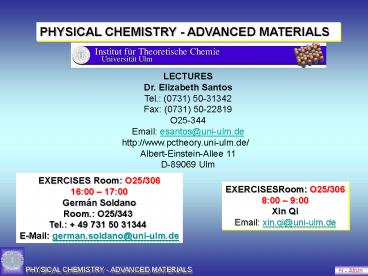PHYSICAL CHEMISTRY ADVANCED MATERIALS - PowerPoint PPT Presentation
1 / 22
Title:
PHYSICAL CHEMISTRY ADVANCED MATERIALS
Description:
Equivalent to two ordinary (not partial) differential equations: Space: f(x) Time: f(t) ... It is essential that you understand the difference between them. ... – PowerPoint PPT presentation
Number of Views:39
Avg rating:3.0/5.0
Title: PHYSICAL CHEMISTRY ADVANCED MATERIALS
1
PHYSICAL CHEMISTRY - ADVANCED MATERIALS
LECTURES Dr. Elizabeth Santos Tel. (0731)
50-31342Fax (0731) 50-22819 O25-344Email
esantos_at_uni-ulm.de http//www.pctheory.uni-ulm.de/
Albert-Einstein-Allee 11D-89069 Ulm
EXERCISES Room O25/306 1600 1700 Germán
Soldano Room. O25/343 Tel. 49 731 50 31344
E-Mail german.soldano_at_uni-ulm.de
EXERCISESRoom O25/306 800 900 Xin QiEmail
xin.qi_at_uni-ulm.de
2
The Hydrogen Atom
Coordinates Systems
e-
r
spherical polar coordinates
re
Z
R
rp
X
Y
center of mass or barycenter
zr cos(q) yrsin(q)sin(f) xrsin(q)cos(f)
reduced mass
3
free particle
4
coulombic potential U-1/r
Z
2-D rvx2 y2
X
Y
1-D rx
3-D rvx2 y2z2
5
z
e-
q
Coordinates Transformation
r
f
x
y
spherical polar coordinates
cartesian coordinates
6
Space f(x)
Time f(t)
Equivalent to two ordinary (not partial)
differential equations
Space X(x)
Time T(t)
7
Wavefunctions (solutions)
8
moment of inertia Imr2 angular
momentum kinetic energy TL2/(2I)
Rotation
If mpgtgtme m me r re
f
e-
tangential component radial
component angular velocity
9
angular momentum vectorial representation
quantum mechanics
me
Analogies Translation Rotation m
I v
w pmv LIw
10
Schrödinger equation
V f(r) ? f(q,f)!!!!
11
Schrödinger equation
kinetic, rotational, coulombic
12
Schrödinger equation
radial, angular wavefunctions
13
If only f changes, then
Constants!!!
14
(No Transcript)
15
Wavefunctions (solutions)
16
Quantum numbers
Principal n 1,2,3,.. Angular l
0,1,2,(n-1) Magnetic m l,(l-1)0.-l
Energy
z component of the angular momentum
Magnitude of the angular momentum
17
Effective potential
The effective potential energy of an electron in
the hydrogen atom. When the electron has zero
orbital angular momentum, the effective potential
energy is the Coulombic potential energy. When
the electron has nonzero orbital angular
momentum, the centrifugal effect gives rise to a
positive contribution which is very large close
to the nucleus. We can expect the l 0 and l ?
0 wavefunctions to be very different near the
nucleus.
eigenvalues
18
Radial wavefunctions
19
Atomic orbitals
What is an atomic orbital? Orbitals and
orbits When the a planet moves around the sun,
you can plot a definite path for it which is
called an orbit. A simple view of the atom looks
similar and you may have pictured the electrons
as orbiting around the nucleus. The truth is
different, and electrons in fact inhabit regions
of space known as orbitals. Orbits and orbitals
sound similar, but they have quite different
meanings. It is essential that you understand the
difference between them. The impossibility of
drawing orbits for electrons To plot a path for
something you need to know exactly where the
object is and be able to work out exactly where
it's going to be an instant later. You can't do
this for electrons. The Heisenberg Uncertainty
Principle says - loosely - that you can't know
with certainty both where an electron is and
where it's going next. (What it actually says is
that it is impossible to define with absolute
precision, at the same time, both the position
and the momentum of an electron.) That makes it
impossible to plot an orbit for an electron
around a nucleus. Is this a big problem? No. If
something is impossible, you have to accept it
and find a way around it.
20
It is not possible to determine the exact
location of an electron in an atom. However, the
probability of finding an electron at a given
position can be calculated. The higher the
probability of finding an electron at a given
position, the larger the electron density at that
position.
An atomic orbital
21
(No Transcript)
22
Some interesting Websites.
http//winter.group.shef.ac.uk/orbitron/
http//www.orbitals.com/orb/
http//www.falstad.com/qmatom/
http//bouman.chem.georgetown.edu/atomorbs/aovis.h
tml
http//electron6.phys.utk.edu/qm2/modules/m1-3/hyd
rogen.htm
http//galileo.phys.virginia.edu/classes/751.mf1i.
fall02/HydrogenAtom.htm































